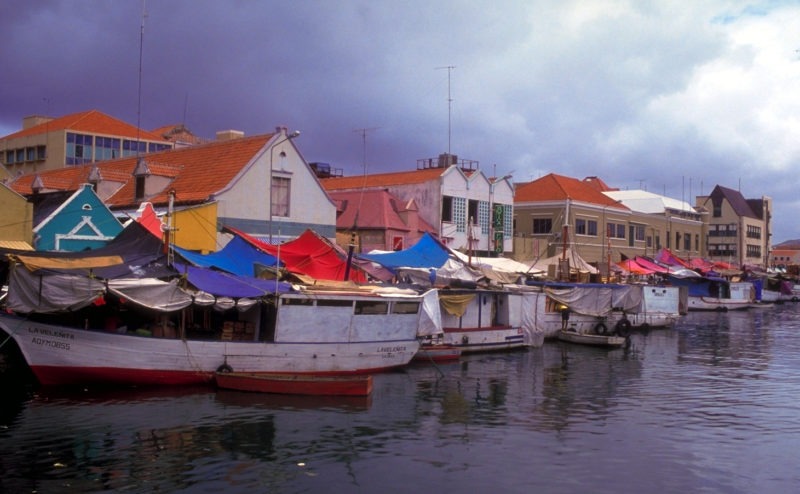
Cultural Exchange
Written by Melanie Turpin | Posted by: Anonymous
Quiet, softspoken, and rather shy of the press, one wouldn’t peg Joan Kaufman as the driving force behind a film that required perilous journeys over exotic waters in rickety wooden boats, bearing witness to early morning police raids and arrests, and interviewing strangers about personal hardships in a foreign language. Her latest film was, however, just such an adventure. Shot on location in Venezuela and on the island of Curaçao, "Floating Market" delves into the complex history and cultural peculiarities of the world-famous symbol from which the film takes its name.
Kaufman’s one-hour documentary explores the Floating Market’s long history as a bustling center of international trade and an important cultural and economic bridge between the Netherlands Antilles and nearby Venezuela. Her eyewitness approach to the documentary also provides a privileged look into the various communities shaped by the market culture, revealing the joys of camaraderie and travel as well as the darker realities of the lifestyles it necessitates.
Shot in digital and High-8 video, the film opens with sweeping shots of the region’s landscape and snippets of street scenes — crystal blue water against white cliffs, children playing on the beach, merchants manning their stands in a lively, colorful marketplace — and moves into a brief narrated history of Venezuela and Curaçao and their long-standing relationship as trading partners. Brief because, in her own words, Kaufman "wanted the men and their wives to tell the story." The Venezuelan merchants and their families, that is, who are at the core of a unique commercial and cultural symbiosis that has endured for decades.
Once a colony of Spain, Venezuela began trading with Curaçao to supplement the insufficient amount of goods imported from its mother country; a dry and arid island, Curaçao never produced much in the way of agriculture, and therefore benefited immensely from the stores of fresh fruits and vegetables brought over on boats from Venezuela. Centuries later, the exchange of goods is as lively as ever, and the Floating Market — formed in downtown Willemstad after 1915, during an economic boom initiated by an oil refinery built on Curaçao — has become both a major center and a symbol of trade in the Antilles.
The picturesque, tropical fruit-laden market — made up of dozens of small wooden boats pulled up along the quay in Willemstad with stands set out in front of them to display the merchandise — also became a center of tourism, and with it, its merchants. Kaufman was something of a tourist there herself when she first began to take interest in the market, during a visit to the island with her partner Elsio Jansen, a native of Curaçao.
"It was hyped as a very important tourist attraction. The tourists were always taking pictures of them; I always felt a little uncomfortable about that — that they live on their boats, and they’re kind of on display… They’re very isolated…" The feeling that the Venezuelan merchants, who may spend as many as eight months away from home each year traveling and selling their goods, were taken for granted by locals and treated by tourists as little more than exotic novelties, inspired Kaufman to give them a voice through film.
A New England native, Kaufman holds degrees from the New England School of Photography and Boston University’s College of Communications. Prior to the making "Floating Market," she produced and directed "Kantik’i Maishi: Songs of Sorghum," a documentary about the harvest celebrations of Curaçao and the small neighboring island of Bonaire, and was associate producer of two films broadcast on PBS, "Zamir: Jewish Voices Return to Poland," and "Leona’s Sister Gerri." What was originally meant to be a career in photography took a definitive turn during a Harvard summer school course: "It was one summer that just pivotal for me," Kaufman says. "Just the intersection of these two…of film and my interest in ethnographic filmmaking… It was wonderful. That just kind of crystallized where I wanted to go in film."
Upon return visits to Curaçao between 1995 and 1997, Kaufman began formulating an idea for a film that would serve as a kind of sequel to "Kantik’i Maishi," leaving the subject of celebration to focus on the importance of trade and commerce in the Antilles, with the Floating Market as its point of departure. Without the means to pay a professional film crew, she brought her video camera to the market almost daily and taped the merchants at their stands, sometimes from morning to night: "I had my little Sony VX 1000 and I had a little shotgun on top of it and I did use a tripod as often as I could, but there I was. It was me and my camera… But I think it worked out for the best… I just formed such a close relationship with these guys."

A still from "Floating Market."
[Click to enlarge]
When she began to approach the merchants for interviews, Kaufman found the merchants delighted and eager to discuss their backgrounds and the families they had left behind in Venezuela. As her interest in their individual "stories" grew, she began to spend more and more time not just interviewing the men, but getting to know them, even spending time on their boats with them in the evening. Kaufman recalls one strategy that was particularly effective for breaking the ice. "I went from one end of the market to the other just taking pictures of everybody… I had double prints printed of everything. So then I would go back and give everyone his own picture, and then I would write on the back of my pictures their names… What was so interesting is when we went to Venezuela, to these little towns, we would go in the houses [of the merchants’ families] and there would be the pictures — hanging up."
The resulting documentary follows the merchants through the various routines of their lives, from the year-round routine of travel to and from Curaçao, to the daily routine of setting up, selling, and breaking down their wares at the market, to the routine of family life back in Venezuela to which they must continually readjust. "Floating Market" begins the thread of their story at home, with the arduous packing of the boats and reluctant goodbyes as they prepare to leave Venezuela for Curaçao. "I do it because I respect his decision," says one tearful wife as she packs a bag for her husband. One of the men sits in a rocking chair, quietly clutching his young son to him.
The long periods spent away from their wives and children pose obvious challenges to family stability and fidelity, a subject to which Kaufman devotes a substantial section of the film. "We tried to make it a lot also about the women, the family life, how they deal with it — two months without the men."
"One particular wife we talked to… her husband had been doing it for like 15 years, and she was a very strong woman," says Kaufman. "She says ‘I have to be the man and the woman, because I’m bringing up the kids…I’m doing it and I don’t want him coming here and putting his rules in.’ So that’s an issue: how do you raise kids with an absentee father?"
Another woman, discussing the inevitability of unfaithful husbands in such a community, said that "as long as [her husband] did it with respect," she wouldn’t complain. Coping strategies varied, but according to Kaufman, the bonds that form between the women in their husbands’ absence was the most important source of solace and support in their lives. "They’re such a tight-knit community," she explains. They’re all supporting each other; they’re all going through the same thing."
The development of such self-contained, self-sufficient communities within a pattern of continual disruption and reformation is a major theme in the film. Once settled at the market, with their boats, Kaufman says, the men form their own society, similar to the women’s in Venezuela. "The market itself is a little community. The men give each other haircuts…they’re cooking on their boats…it’s like a little village of its own. And at the same time, they’re a little community within the larger community of Curaçao."
Rather than rely solely on interviews for a sense of what this community life must be like through the merchants’ eyes, Kaufman decided to get deeper inside of it herself, and make the dangerous overnight journey between Venezuela and Curaçao on one of the trading boats.
"I knew I had to go on one of these trips. It was wildly exciting… It should have been 18 hours, but it ended up being like over a day and a half… I woke up during the night and I heard men shouting into the radio… The water pump had broken, and we ended up just drifting all night and we arrived 36 hours instead of 18 hours after we had left. It’s not an easy trip… it’s uncomfortable, there’s no bathroom… This is not a luxury boat."
More threatening than the unpleasant accommodations aboard the often worn and unstable boats is the danger of accidents at sea. A few weeks after Kaufman’s second boat trip between Venezuela and Curaçao, one of the boats sank, drowning several of its crew members. "This happens from time to time," she says. "So I shot a little section about that, about the drowning. So then there’s this whole kind of darker side that we get into."
Periodic searches of the mens’ boats for contraband were another sobering reality for the filmmaker. "On one of the boats that I was so close to, one of the guys was arrested, and I just happened to be there, so I just shot it."
Undaunted by such occupational hazards, the only thing that seems to have slowed Kaufman down at any point in her mission to complete the film is funding. Production was repeatedly stalled during shooting due to lack of funds, and then again after Kaufman and her editor, Iftach Shavit, had assembled an initial 25-minute version of the film. With the help of the partially finished film and agencies such as Prins Bernhard Cultuurrfonds Nederlandse Antillen en Aruba (a private cultural funding organization serving the Antilles and Aruba), the owners of the oil refinery in Curaçao, and various small businesses on the island, Kaufman and Shavit were able to extend the documentary to its intended 60-minute length.
Fortunately, finding an outlet for the film has not been quite so challenging. Though editing of "Floating Market" was only finished earlier this year, the film is already slated to premiere at the Museum of Fine Arts in Boston as part of its New England Film Artists Present series in October and November.
When asked why she made the switch from photography to film, Kaufman replied, "I wanted to do more than just look at the image. "I wanted to hear what the people had to say. So I think that’s really the base, the foundation of my interest in filmmaking — is to hear what people have to say… The guys and the families were so enthusiastic about the chance to tell their own story. Certainly they have been the subject of many tourist films…people were always shooting them for something. But this was a chance for them to tell their own story…"
"Floating Market" will be screened at the Museum of Fine Arts Boston on October 24th at 6 pm and on November 1st at 2 pm. The filmmaker and the editor will be present.









